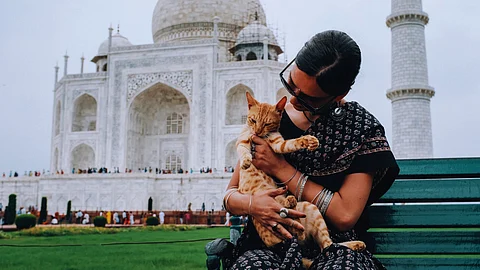
- HOMEGROWN WORLD
- #HGCREATORS
- #HGEXPLORE
- #HGVOICES
- #HGSHOP
- CAREERS
- ABOUT US
- CONTACT US

Cats have undeniably established their reign over the internet with their adorable antics and charm in videos, memes, and trends. However, in India, the sight of cats freely roaming the streets as well as in our homes as pets is less common when compared to the almost ubiquitous presence of dogs. This stark contrast can be attributed to the historical and cultural context surrounding cats in India. Despite a growing number of young cat owners, their portrayal as omens of bad luck or supernatural entities has perpetuated a reluctance to embrace them as household companions in older generations.
In Hindu mythology, cows monkeys, parrots, elephants etc. are highly revered but there are very few mentions of cats. They are only associated with some deities and have both positive and negative symbolism. Goddess Shashthi, the protector of children, is often depicted riding a cat. Cats are also believed to be the vehicles of Vahana (mount) for certain Hindu gods, such as Kaumari, a form of Lord Kartikeya. Whenever they are mentioned, it's only because of their sneaky qualities.
On the other hand, during the Mughal era in India ( the 16th to the 19th century), cats were highly regarded and enjoyed a privileged status. The Mughal emperors, especially Akbar the Great, were known for their fondness for cats and kept them as companions. Cats were cherished for their grace, beauty, and hunting abilities. Paintings from the Mughal era often depicted royal figures and cats together, showcasing their significance in courtly life.
In Indian households, cats often do not enjoy the same popularity as other pets, partly due to their portrayal in Hindu mythology. They are deemed unlucky and associated with sorcery, symbolizing hypocrisy and insincerity. Additionally, the South Asian value of obedience, which is highly admired, contrasts with the independent nature of cats. Unlike dogs, cats are not seen as creatures that readily offer unconditional loyalty or fulfill specific roles for their human counterparts. This mismatch between the cultural expectation of obedience and the inherent free-spiritedness of cats can sometimes lead to a perceived offence among Indians who value control and hierarchy in their interactions.
Cats are most likely to remain less popular in India. Even as strays, there's no culture of feeding and petting them in public like we do dogs because cats can't exist safely in the streets due to the population of stray dogs chasing them. Even if you find one, it usually won't be as easy as calling a dog over because most cats don't trust easily. The cat-human relationship develops over time with continued reliability. But once they have bonded with you, they offer the most affectionate and enriching companionship a person can experience, even when it comes to parents who initially hesitated on account of their superstitions. The proof is a whole genre of Brown 'dad/mom who didn't want a cat' videos of people loving cats like their own children.
